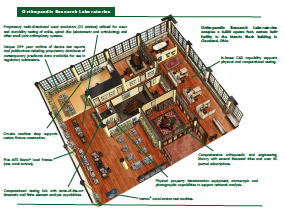Standards Testing

Standards Testing - General
For more than four decades, ORL is recognized as an innovator of testing standards and methods with an extensive track record of providing information necessary for successful regulatory approvals, product quality confirmation, marketing materials and surgeon education. This Standards listing encapsulates the breadth of this expertise.
ASTM F543 - Standard Specification and Test Methods for Metallic Medical Bone Screws
This test method is used to measure the torsional yield strength, maximum torque, and breaking angle of the bone screw under standard conditions.
ASTM F451 - Standard Specification for Acrylic Bone Cement
This specification covers self-curing resins used primarily for the fixation of internal orthopedic prostheses. While a variety of copolymers and comonomers may be incorporated, the composition of the set cement shall contain poly(methacrylic acid esters) as its main ingredient. This specification covers compositional, physical performance, and biocompatibility as well as packaging requirements. Materials shall be tested and shall conform to specified values of appearance, stability, sterility, viscosity, intrusion and compressive strength.
ASTM F621 - Standard Specification for Stainless Steel Forgings for Surgical Implants
This specification covers the requirements for stainless steel forgings for surgical implants.
ASTM F732 - Standard Test Method for Wear Testing of Polymeric Materials Used in Total Joint Prostheses
This test method is intended to be performed in conjunction with pin-on-flat wear machines or similar machines that are designed to evaluate simplified specimen geometries.
ASTM F1044 - Standard Test Method for Shear Testing of Calcium Phosphate Coatings and Metallic Coatings
The shear test method is recommended for shear testing of calcium phosphate and metallic/substrate combinations and can provide information on the adhesive or cohesive strength of coatings under a uniaxial shear stress.
ASTM F1160 - Standard Test Method for Shear and Bending Fatigue Testing of Calcium Phosphate and Metallic Medical and Composite Calcium Phosphate/Metallic Coatings
This test method covers the procedure for determining the shear and bending fatigue performance of calcium phosphate coatings and of porous and nonporous metallic coatings and for determining the bending fatigue performance of metallic coatings over sprayed with calcium phosphate.
ASTM F2003 - Standard Practice for Accelerated Aging of Ultra-High Molecular Weight Polyethylene after Gamma Irradiation in Air
This practice describes a laboratory procedure for accelerated aging of ultra-high molecular weight polyethylene (UHMWPE) specimens and components for total joint prostheses.
ASTM F2009 - Standard Test Method for Determining the Axial Disassembly Force of Taper Connections of Modular Prostheses
This test method establishes a standard methodology for determining the force required to disassemble tapers of implants.
ASTM F2025 - Standard Practice for Gravimetric Measurement of Polymeric Components for Wear Assessment
This practice describes a weight-loss technique for evaluating the wear properties of polymeric materials or devices which are being considered for use as bearing surfaces in joint replacement prostheses that are being evaluated in a device intended to simulate the tribological conditions encountered in the respective human joint.
ASTM F2118 - Standard Test Method for Constant Amplitude of Force Controlled Fatigue Testing of Acrylic Bone Cement Materials
This test method describes a uniaxial, constant amplitude, fully reversed fatigue test to characterize the fatigue performance of a uniform cylindrical waisted specimen manufactured from acrylic bone cement.
ASTM F2180 - Standard Specification for Metallic Implantable Strands and Cables
This specification covers the materials, dimensional tolerances, constructions, and mechanical properties for standard metallic implantable strands and cables.
ASTM F3087 - Standard Specification for Acrylic Molding Resins for Medical Implant Applications
This specification covers requirements and corresponding test methods for acrylic resins supplied in virgin form (typically pellets, powder, or granules) for medical implant applications.
ISO 5838-1 - Implants for surgery — Metallic skeletal pins and wires — Part 1: General requirements
This part specifies general requirements for metallic skeletal pins and wires for use in bone surgery, excluding wires for binding and twisting.
ISO 5838-2 - Implants for surgery — Skeletal pins and wires — Part 2: Steinmann skeletal pins — Dimensions
This part specifies the dimensions for Steinmann skeletal pins.
ISO 5838-3 - Implants for surgery — Skeletal pins and wires — Part 3: Kirschner skeletal wires
This part specifies the characteristics (dimensions, ends, marking and packaging) of Kirschner wires.
ISO 5843-3 - Implants for surgery — Ultra-high-molecular-weight polyethylene — Part 3: Accelerated ageing methods
Implants for surgery — Ultra-high-molecular-weight polyethylene — Part 3: Accelerated ageing methods
ISO 9585 - Implants for surgery — Determination of bending strength and stiffness of bone plates
Describes a test method for straight plates but may also be used for ones having a small initial curvature.
ISO 10993-15 - Biological evaluation of medical devices — Part 15: Identification and quantification of degradation products from metals and alloys
This document specifies general requirements for the design of tests for identifying and quantifying degradation products from final metallic medical devices or corresponding material samples finished as ready for clinical use.
ISO 16402 - Implants for surgery — Acrylic resin cement — Flexural fatigue testing of acrylic resin cements used in orthopaedics
Applies to resin cements based on poly(methacrylic acid esters) and specifies the procedure for determining the fatigue behaviour of the polymerized cement.
ISO 21534 - Non-active surgical implants — Joint replacement implants — Particular requirements
Specifies particular requirements for total and partial joint replacement implants, artificial ligaments and bone cement, referred to as implants and specifies requirements for intended performance, design attributes, materials, design evaluation, manufacturing, sterilization, packaging and information to be supplied by the manufacturer.
ISO 22214 - Fine ceramics (advanced ceramics, advanced technical ceramics) — Test method for cyclic bending fatigue of monolithic ceramics at room temperature
Specifies a test method for four-point cyclic bending fatigue of fine ceramics that are carried out in the air at room temperature. This test may be used as a pass/fail test for material qualification purposes, or for determination of the overall fatigue behaviour at several different stress levels.

